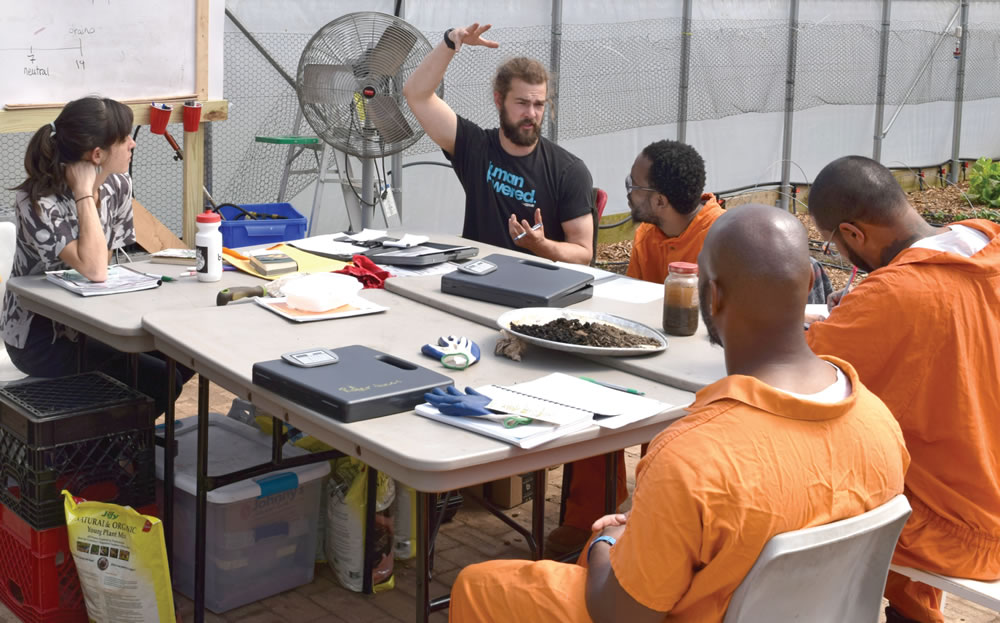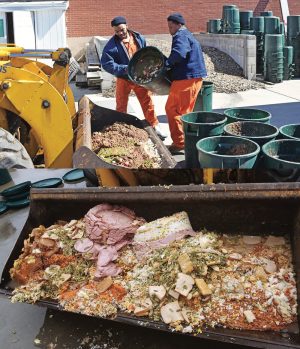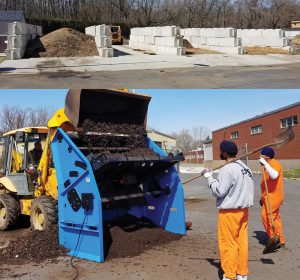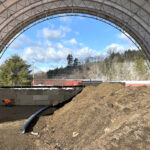Collaborative noncredit certificate program provides experiential learning in composting, urban greening and sustainable land care to low-risk inmates in the Philadelphia prison system.
James F. Duffy
BioCycle May/June 2019
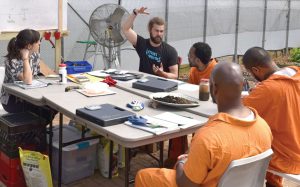
The first component of the certificate program introduces students to fundamentals of organic agriculture through classroom lessons. Photo by Erin Mihalik
Laura Cassidy has a specific goal in mind, one she’s had for decades that, when achieved, changes lives and communities for the better. Working with partners such as Temple University and the Pennsylvania Horticultural Society (PHS), Cassidy hopes that she never again sees the individuals she works with — at least not in their present incarcerated circumstances. While they are learning important skills about composting, orchard care and other staples of the green industry, their dedicated work can set them on a different path.
“They work very hard, take pride in what they are doing and go that extra mile,” notes Cassidy, Sustainability Manager for the Philadelphia Department of Prisons (PDP). “There is an enormous sense of accomplishment when one of the guys calls and tells me he is doing well, completed a degree at Temple or landed a good job at an orchard. We are all working toward the goal of reducing recidivism.”
To meet that goal Temple University, in partnership with PHS, the PDP, the Defender’s Association, the Philadelphia Department of Public Health–Get Healthy Philly, and RISE (The Mayor’s Office of Reintegration Services), have created a collaborative noncredit certificate program that provides experiential learning in urban greening and sustainable land care to low-risk inmates in the Philadelphia prison system.
Certificate Program
The Vocational Certificate in Urban Greening and Sustainable Land Care, now in its second cohort, is designed to teach inmates within the Philadelphia prison system the skills necessary to achieve employment in a variety of green industries. “Each of our graduating students completes a 12-week educational program followed by a 6-week paid internship at either PHS or Temple University,” explains Vanessa Williams, Instructional Designer/Trainer in Temple’s Office of Off-Campus Programs and Training, which oversees the certificate program. “Our students are putting in the essential work to turn their lives around, building their futures while ensuring a sustainable future for their communities.”
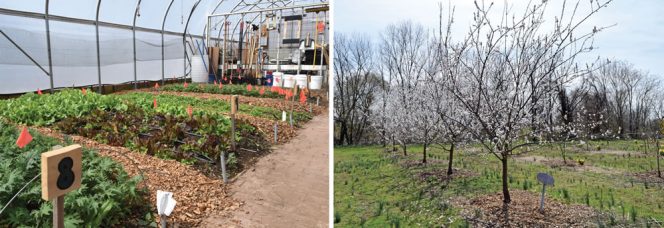
The hands-on practical application of classroom lessons takes place in the prison’s 200-tree orchard (far right), greenhouse (right), and composting facility. Skills taught include raised bed construction and weed management. Photos by Erin Mihalik
The first component of the certificate program introduces students to the fundamentals of organic agriculture through classroom lessons and hands-on practical application in the prison’s 200-tree orchard, greenhouse and composting facility (see sidebar) or PHS’s farm. “Students learn about planting, weeding, crop rotation, weed management, raised bed construction and other fundamental horticulture and landscaping skills,” adds Williams.
During the first cohort, interns with PHS helped to landscape the Navy Yard, construct a shed for a community center and planted an urban garden near City Hall. The Temple interns have supported the University’s Pan-African Studies Community Education Program and Office of Off-Campus Programs and Training, working with members of the public on computer skills, running job fairs, participating in research and networking.
“In addition to lowering recidivism, our overarching goal with this program is to help our students reintegrate with society and find full-time jobs with a living wage,” she says. “Temple and PHS continue to provide job search and career support as they re-enter the workplace. Our students learn about sustainable living through real-world horticulture and agricultural experiences, develop a strong sense of purpose, connect with the land and learn to live healthier lives.”
Tale Of Two Programs
Curriculum for the Vocational Certificate in Urban Greening and Sustainable Land Care was developed by combining two existing Temple and PHS programs, according to Nicole Westrick, Associate Vice Provost in Temple’s University College. University College seeks to provide access to quality educational programs and services for a diverse community of traditional and nontraditional adult learners who seek enhanced knowledge and skills through credit, noncredit, and continuing education programs offered at its regional campuses, off-campus locations, and online.
“Prior to the current certificate program, Temple offered a Vocational Certificate in Organic Agriculture and Sustainability while PHS offered its Roots to Re-entry program,” explains Westrick. “The PDP wanted to consolidate the two programs. Working closely with PHS, we developed a new curriculum that combines the best of both.”
The PHS’s Roots to Re-entry Program began in 2010. “Prior to Roots to Re-entry, PHS was running a farm and greenhouse program within the Philadelphia prison system that continues to exist,” notes Mai Schwartz, PHS’ Program Manager for Roots to Re-entry.
“Because the jobs in our region are primarily within the landscaping industry, it made sense to shift the focus of our training to horticulture and landscape management. Working with Nicole and Temple’s Off-Campus Programs and Training office, the curriculum as a whole includes experiential learning in agriculture and orchard care, landscaping, composting and organic horticulture. My goal as an educator is to help our students meet their goals and we talk regularly about what those could be.”
According to Cassidy, the PDP has had an ongoing successful relationship with PHS for nearly 15 years. The composting program that she developed, now part of the Vocational Certificate, initially started as a recycling program. “The prison system spent about $250,000 annually on solid waste disposal, explains Cassidy. “If we took the food waste out of that equation, we showed that we could save about 70 percent. We asked the U.S. EPA to show us how to develop a composting operation and they provided us with a grant to build an aerated static pile system. Subsequently we were provided additional support — a $200,000 grant — from the City of Philadelphia’s Office of Sustainability.”
Fairmont Park donated 200 fruit bearing trees, which are now part of the six-square-mile campus that houses the composting operation at the prison complex in northeast Philadelphia. “We started devising the idea of an educational vocational program with these components conceptually all together,” she adds. “With Temple and PHS and our other partners, we’ve been able to make that happen.”
Life Lessons
In the classroom component of the certificate program, students learn about horticulture and organic landscaping — “everything from plant biology and plant identification to garden design and greenhouse management,” notes Schwartz. “We cover the skills that employers look for. Our students also get exposure to the University and receive a certificate from Temple, which I think gives them a real sense of accomplishment and a boost to their confidence as they re-enter the workforce. Having PHS and Temple in their corner as they navigate the transition back into their communities can be really helpful. The paid internships provide a strong foundation to build on. The graduation ceremony that is the culmination of the program can be very meaningful for students and their families after all of the work they’ve put into it.”
The various partners that support the Vocational Certificate are also providing additional important elements to the program. For example, the Mayor’s Office of Reintegration Services focuses on life skills, such as communication styles, family relationships and emotional intelligence and management. The job readiness training, provided by Temple, includes instruction in résumé writing, interview etiquette, including mock interviews, and public speaking, “which are crucial for successful job seeking post-release,” says Westrick. Get Healthy Philly additionally provides lessons in nutrition and meal planning.
Earning Recognition
In late 2018, Temple’s Vocational Certificate in Urban Greening and Sustainable Land Care program was presented with a 2018 Mid-Atlantic Region Outstanding Program Award by the University Professional Continuing Education Association (UPCEA). The award is presented to “an effective, innovative and exceptional credit or non-credit program,” according to the UPCEA. The program must be original and innovative to the continuing education field; demonstrate a contribution to the field that may be replicated by other higher education institutions; and show quality and effectiveness. “I think what makes this program unique is that we are involved with so many partners,” notes Williams. “We had two successful programs, took a very comprehensive look at what those programs did and didn’t do, and developed a single one designed to provide our students with an improved experience and an even larger skill set.”
Westrick emphasizes the benefit of collaborating with an established program like PHS’s Roots to Re-entry and its longstanding relationships with organizations such as the Defender’s Association. “It expanded the potential for meaningful employment — in a field that is growing all the time — for our students, many of whom will need to continue to reside in Philadelphia after their release,” she says. “In addition, I think this program introduces our students to a field that maybe they never considered before, plus expands their worldview, increasing their awareness of global ecosystems. We’ve become so far removed from the land, particularly in dense, urban environments. This provides a real connection, a real sense that they can do something for this Earth for this generation and the next.”
Ultimately, Schwartz adds, landscaping and other green industry fields “may not be for everyone who goes through the program.” But in the process, “they are also practicing communication skills, emotional skills, life skills, problem-solving skills — ways to positively and effectively deal with the world at large,” he says. “These are skills that can help them succeed in anything they pursue.”
James F. Duffy is Content Manager at Temple University Ambler and University College. He is involved in all aspects of internal and external communication for a variety of Temple programs.


